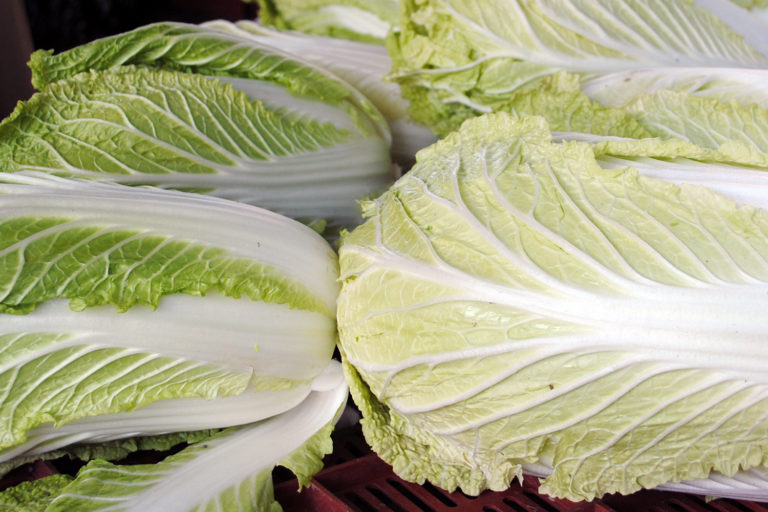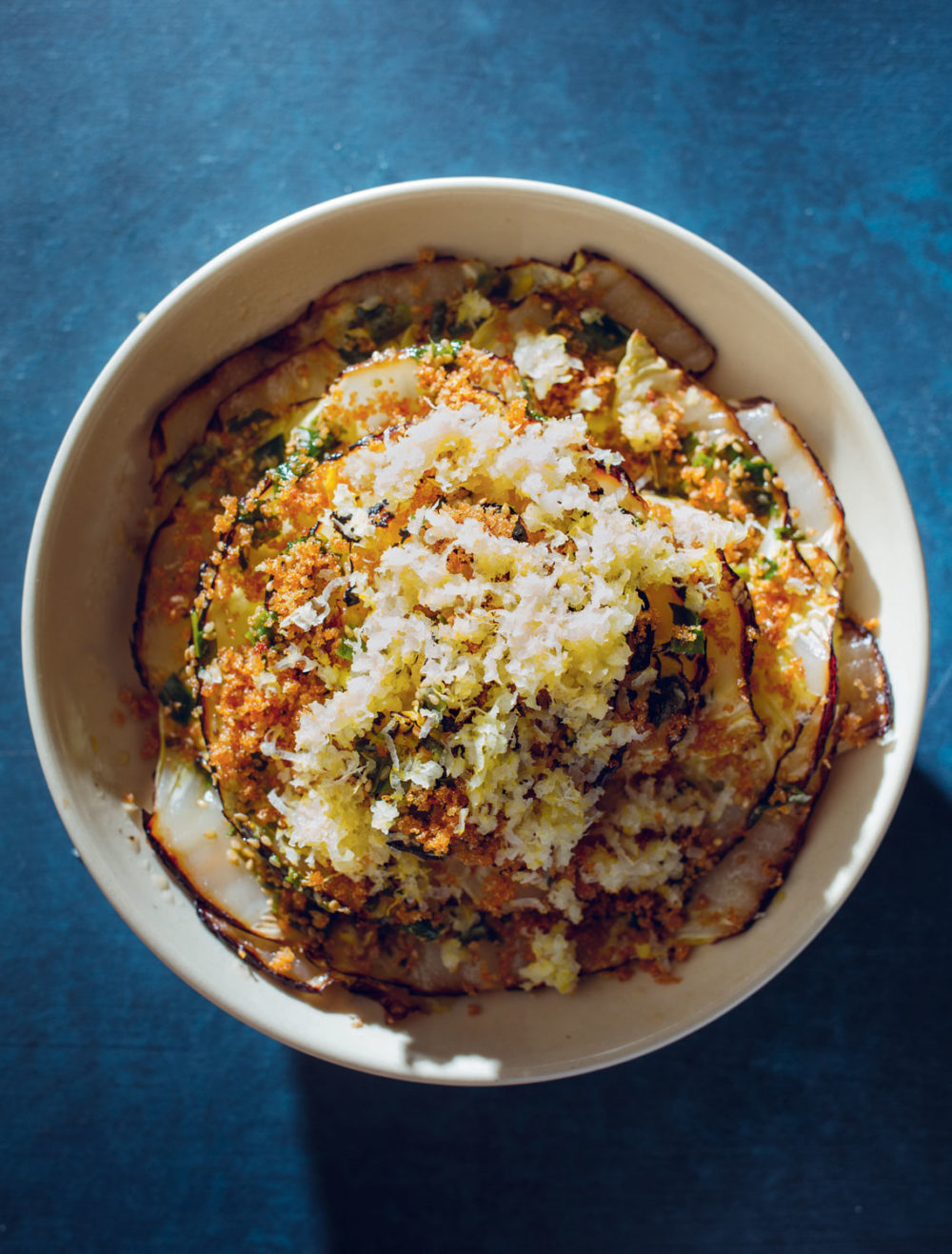
Seared Napa Cabbage
Source: Brandon Jew, Mister Jiu's in Chinatown

Recipe Type: Entrees | Seasons: Spring, Winter
This is a recipe that lavishes the humble napa cabbage with some overdue decadence. If you treat a cabbage as you would a dry-aged steak, it will morph into tender sheaves with varied degrees of sweet and smoky caramelization, full of complex flavor and texture. When charring the cabbage in duck fat, take it to the edge of burnt. The wok or cast-iron pan must be very hot to quickly draw out all the sugar and water in the cabbage leaves. As your kitchen fills with smoke (turn on the fan and open the windows), reassure everyone nearby that this is all part of the plan (especially any Chinese people—deeply caramelized vegetables are not so customary in Chinese cuisine). Right when you think the cabbage may be getting too dark, give it another long 5 seconds before pulling it from the pan.
Makes 4 servings
Active Time — 1½ hours
Plan Ahead — You’ll also need time to make Chicken Stock. Start making the sauce, potato crisps and purée, and relish 1½ hours before serving.
Special Equipment — Deep-fry thermometer, blender, kitchen twine, Microplane
INGREDIENTS
Yuzu Sauce
1 cup / 240ml Chicken Stock
5½ tsp premium soy sauce (頭抽, tàuh chāu)
1 Tbsp plus ½ tsp 100% yuzu juice
Potato Crisps
1 qt / 950ml neutral oil
1 medium russet potato
4 garlic cloves, peeled
Kosher salt
Chinese Chive Relish
1 Tbsp raw white sesame seeds
¼ cup / 20g thinly sliced Chinese chives
½ tsp peeled and minced ginger
½ tsp kosher salt
¼ tsp ground white pepper
¼ cup / 60ml neutral oil1 Tbsp finely chopped cilantro leaves and stems
Potato Purée
1 large russet potato, peeled and cut into large dice
1 large Yukon gold potato, peeled and cut into large dice
Kosher salt
1 Tbsp duck fat
⅓ cup / 80ml unsweetened soy milk
One 1½-lb / 680g napa cabbage (about 5 inches wide and 10 inches long)
¼ cup / 50g duck fat
1 Buddha’s hand or Meyer lemon
PREPARATION
To make the sauce: In a small saucepan over medium-high heat, simmer the chicken stock until reduced to ¼ cup / 60ml, about 12 minutes. Remove from the heat and stir in the soy sauce and yuzu juice. Let cool, transfer to an airtight container, and store in the refrigerator for up to 5 days.
To make the crisps: Fill a wok or large saucepan with the neutral oil and secure a deep-fry thermometer on the side. Set over medium-high heat and warm the oil to 350°F, being careful to maintain this temperature as you fry.
Meanwhile, peel and then grate the potato on the large holes of a box grater. (You can simply dice the potato if your blender can handle it, but grating releases starchy juices that better bind the crisps.) In a blender, combine the potato and garlic and blend on high speed, scraping down the sides of the blender jar often, into a smooth paste. Transfer to a piping bag, squeeze bottle, or zip-top plastic bag (snip off a corner of the bag to create a small hole when you’re ready to go).
Line a plate with a double layer of paper towels.
Squeeze some of the potato purée into the hot oil in a zigzag motion about 4 inches long. Fry, stirring occasionally, until dark golden brown and crisp, about 1 minute. Using a slotted spoon or spider, transfer the finished crisp to the prepared plate. It will break up into pea-size irregular pieces. Immediately season with salt and set aside to cool. Repeat with the remaining purée. Once cool, transfer to an airtight container and store at room temperature for up to 1 week.
To make the relish: In a small frying pan over medium heat, toast the sesame seeds, tossing occasionally, until fragrant and light golden brown, 2 to 3 minutes. Transfer to a small heatproof bowl and stir in the chives, ginger, salt, and pepper. In a small saucepan over medium-high heat, warm the neutral oil just until it starts to smoke. Immediately pour the oil over the chive mixture and stir to combine. Set aside to cool. Stir in the cilantro, transfer to an airtight container, and store in the refrigerator for up to 5 days.
To make the purée: Place both potatoes in a small saucepan and cover with cold water by 1 inch. Stir in 1 tsp salt and bring to a simmer over medium-high heat. Simmer until knife-tender, about 10 minutes. Drain the potatoes and set aside.
In the same saucepan over medium-low heat, warm the duck fat until melted. Add the potatoes back to the pan by passing through a ricer or mashing them with a potato masher until very smooth. Stir to be sure the starch and fat are thoroughly combined, then stir in the soy milk and ½ tsp salt. Taste and season with more salt if needed. Keep warm, or let cool, transfer to an airtight container, and store in the refrigerator for up to 5 days. Rewarm gently over low heat.
Preheat the oven to 425°F.
Starting about 2 inches from the stem end of the cabbage, tie pieces of kitchen twine tightly around the cabbage every 2 inches, then cut the cabbage into three 2-inch-thick cross-sections, keeping the twine intact and centered. Wrap more twine around each cabbage steak a few times (perpendicular to the first twine) to keep the leaves tight. This will ensure the steaks develop an even, crisp crust.
In a large oven-safe frying pan over high heat, warm the duck fat until just starting to smoke. Add the cabbage to the pan and don’t disturb them until they are charred on the bottom, 3 to 4 minutes. Leave them in the pan (don’t flip), transfer to the oven, and roast until crisp-tender, 5 to 7 minutes.
Spread the potato purée on a wide, rimmed serving platter. Settle the cabbage on the purée, then cut and remove the twine. Gently open up the cabbages so they look nice, like little flowers. Drizzle a few spoonfuls of the yuzu sauce and Chinese chive relish on top and in between the leaves. With a Microplane, generously grate the zest of the Buddha’s hand over everything. Crown with a handful of potato crisps and serve immediately.
Reprinted with permission from Mister Jiu’s in Chinatown: Recipes and Stories from the Birthplace of Chinese American Food by Brandon Jew and Tienlon Ho, copyright © 2021. Published by Ten Speed Press, an imprint of Penguin Random House. Photography copyright: Pete Lee © 2021.
Farmers Market Ingredients


